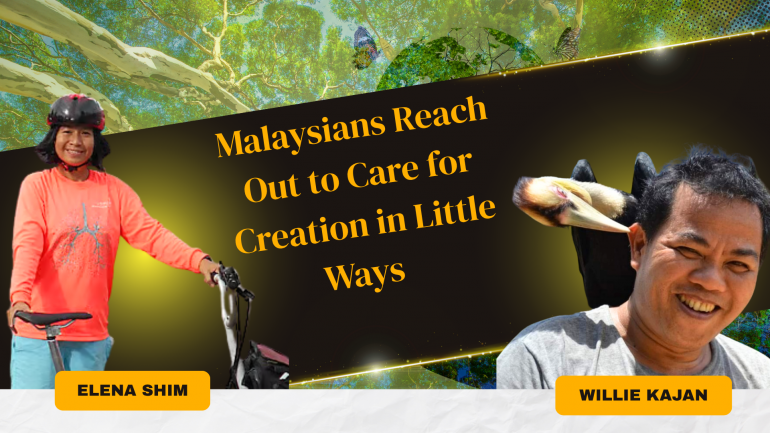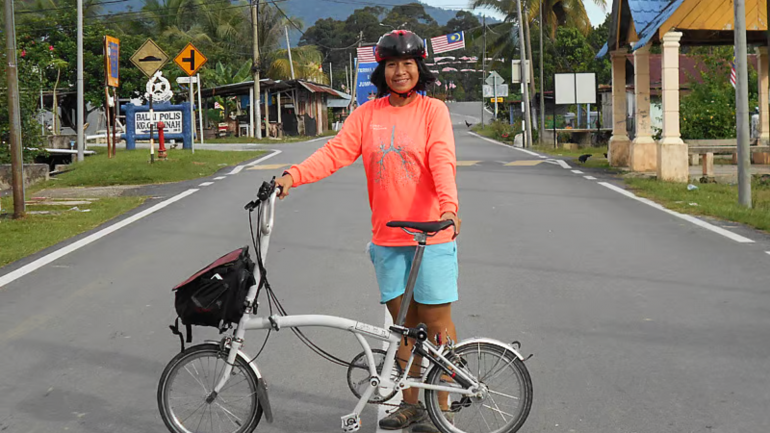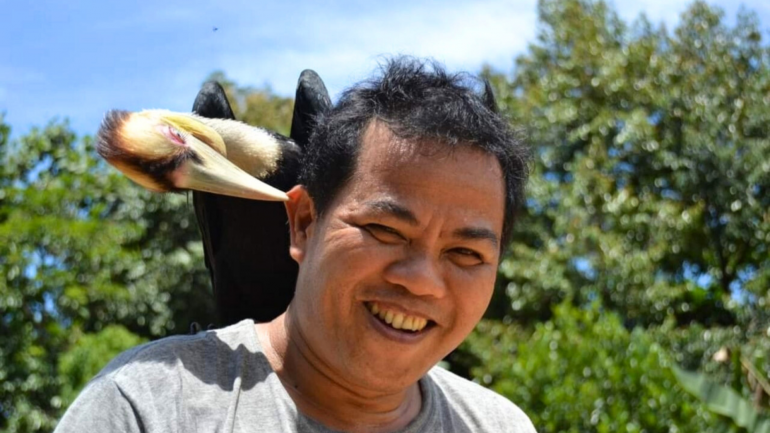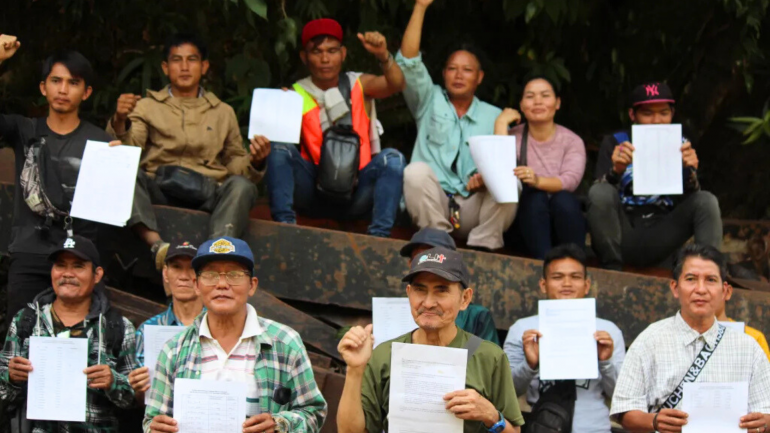Malaysians Reach Out to Care for Creation in Little Ways

In Malaysia, caring for creation has become more than a moral choice, it is now a living expression of faith. Across dioceses, Catholic communities are translating Pope Francis’s Laudato Si’ into daily acts of stewardship, integrating ecological awareness into prayer, education, and parish life.
Among those leading the movement is Elena Shim, a volunteer with the Archdiocese of Kuala Lumpur. Once a lawyer and now a tour guide, she has emerged as a bridge between the Church, government agencies, and environmental NGOs.
“The Archdiocese’s commitment to Laudato Si’ is about caring for creation as a real part of our faith life,” Shim told Radio Veritas Asia (RVA). “It’s not optional; it’s Gospel living.”
She breaks this down into three dimensions: “First, in our spiritual life, we integrate creation care into our prayers, liturgy, and catechesis, from homilies to formation programs.
Second, in concrete action, parishes, schools, and institutions are going green by reducing waste, planting trees, and conserving energy. Many now have Laudato Si’ teams to sustain small but consistent initiatives.
Third, in public witness, we stand in solidarity with those affected by pollution, deforestation, and climate change, working with others to protect our common home.”
Shim describes this as “ecological conversion,” a change in heart and habit that unites faith with environmental responsibility. “Malaysia faces floods, river pollution, deforestation, and haze. These aren’t distant issues; they affect families and the poor. Living simply, reducing waste, and rethinking consumption are acts of justice.”

From Prayer to Practice: Faith on the Ground
At the parish level, this conversion takes root in simple but transformative ways. Church compounds are turning green with tree planting; parishioners join beach and river clean-ups; recycling drives and waste reduction campaigns are now regular features of parish calendars. Environmental education is being integrated into catechism classes, helping the young see that caring for creation is part of loving God.
Each September, the Archdiocese of Kuala Lumpur observes the Season of Creation, from September 1 (World Day of Prayer for Creation) to October 4 (Feast of St. Francis of Assisi). During this period, parishes hold outdoor Masses, reflective retreats, “plogging” (picking up litter while jogging), and community reforestation.
“Collaboration is key,” Shim explained. “We’ve partnered with the Forestry Department for tree planting, LUAS for river protection, Prasarana for sustainable transport advocacy, and NGOs such as Tzu Chi Foundation, Lifeline Clothing, and the Free Tree Society.”
These partnerships have made possible initiatives ranging from river clean-ups in Klang to greening programmes in Shah Alam, with future projects planned in Pahang and Negeri Sembilan.
Shim herself embodies what she preaches. She cycles five kilometres to work daily, composts food waste, and volunteers in her residents’ association and Local Agenda 21 Committee, a community-driven initiative for sustainable development.
“It’s fulfilling to see small acts bear fruit, literally. My dragonfruit plant finally produced fruit after four years,” she said happily.
Another inspiring figure is Marie M. Mariasusai, a retired project manager who now dedicates her time to parish service and social outreach. She, too, links faith to environmental responsibility.
“Our daily choices, what we buy, what we throw away- are moral decisions,” Marie told Radio Veritas Asia. In 2024, she published Beyond the Cart, a book exploring how consumerism drives climate change and offering practical steps toward sustainable living. Now she works with dioceses to create workshops and resources for Catholic families and parishes.
“Consumerism fuels ecological destruction. The Church has a prophetic role in helping people see that caring for creation is both spiritual and moral,” she said. “It’s not about perfection; it’s about forming habits that reflect gratitude and respect for God’s world.”

Faith, Justice, and Environmental Advocacy in Sarawak
In Sarawak, the call to care for creation is deeply tied to indigenous struggles for land and life.
Earlier this year, 29 settlements along the Tutoh River mobilised against the proposed cascading dam project near Mulu, a UNESCO World Heritage Site, citing inadequate consultation and fear of ecological loss. Willie Kajan, a local rights advocate from Mulu, told RVA, “The dam threatens our way of life. We want proper consultation before any project affects our ancestral land. Only then can we give or withhold consent.”
Bishop Richard Ng of Miri has expressed strong support for indigenous communities facing environmental and cultural displacement. “Our forests are not only ecological treasures but also part of our people’s identity and livelihood,” he said. “The Church must walk alongside them, advocating for sustainable development and protecting God’s creation.”
This advocacy aligns with a collective pledge signed by all nine Malaysian bishops in 2024, committing to make every parish in the country “ecologically friendly” through formation, green infrastructure, and lifestyle change. In Peninsular Malaysia, similar momentum is building. Urban dioceses run awareness campaigns, recycling drives, and environmental education in Catholic schools, where children learn that caring for the Earth is not just science, but discipleship.

Towards an Ecological Church
Looking ahead, Shim envisions a Church that moves beyond parish-level projects to engage boldly with larger environmental issues. “I hope that in the next decade, our Archdiocese takes courageous stances — on haze, indigenous rights, and environmental justice,” she said. “We must be a prophetic voice rooted in faith, hope, and care for creation.”
Her dream is of an “ecological Church,” one where the Gospel is preached not only in words but in actions that restore the land and defend the vulnerable. “Our faith isn’t confined to the four walls of the church,” she said. “When we reduce waste, plant trees, or cycle instead of drive, we show that caring for creation is an act of love. It’s how we live our faith.”
From homilies on creation care to hands-on clean-ups, from compost bins to community advocacy, Malaysian Catholics are demonstrating that Laudato Si’ is not merely a papal document; it is a lived spirituality.
With volunteers like Elena Shim, Marie Mariasusai, and indigenous advocates such as Willie Kajan, backed by bishops like Richard Ng, the Church in Malaysia is proving that faith, ecology, and justice are inseparable.
Across the nation, small acts, planting trees, cleaning rivers, cycling to work, are becoming acts of worship, transforming ordinary believers into environmental witnesses.
These quiet gestures, multiplied across parishes, schools, and homes, form what Pope Francis calls an “ecological conversion of the heart.”
It may be a silent revolution, but its effects ripple far beyond church walls, reshaping hearts, landscapes, and the moral imagination of a nation learning to live once again in harmony with the Earth.








